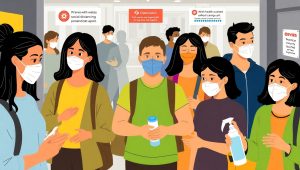
As the world continues to grapple with the COVID-19 pandemic, it’s essential for everyone to stay informed about the necessary precautions to keep themselves and others safe. Whether you’re at home, at work, or in public spaces, understanding how to prevent the spread of the virus is critical. This guide will provide you with actionable steps to ensure your safety and that of those around you during this challenging time.
1. Follow Local Health Guidelines
The situation regarding COVID-19 can vary depending on where you live, so it’s important to follow the guidelines provided by your local health authorities. These recommendations are updated regularly based on the latest data and can provide specific advice on travel, quarantine, social distancing, and mask usage. Staying up to date with these guidelines is one of the best ways to protect yourself and others.
2. Practice Social Distancing
Social distancing is one of the most effective measures in reducing the spread of the virus. By maintaining at least 6 feet (2 meters) of distance from others, you decrease the likelihood of coming into contact with respiratory droplets that may contain the virus. This is especially important in crowded spaces, public transport, and gatherings where people may not be wearing masks. Avoid close-contact activities and consider virtual options for meetings or social events whenever possible.
3. Wear a Mask Properly
Wearing a mask is a key preventive measure that helps reduce the transmission of COVID-19, especially when social distancing is not possible. Make sure to wear a mask that covers both your nose and mouth. Cloth masks, surgical masks, or KN95 masks are commonly recommended, but make sure the mask fits snugly to avoid gaps where air or droplets can pass through. Masks are particularly important when you are in indoor public spaces or crowded areas.
4. Wash Your Hands Frequently
Proper hand hygiene is one of the simplest but most effective ways to prevent the spread of COVID-19. Wash your hands with soap and water for at least 20 seconds, especially after being in public spaces, touching surfaces, or before eating. If soap and water aren’t available, use hand sanitizer with at least 60% alcohol. Avoid touching your face, particularly your eyes, nose, and mouth, to prevent transferring the virus from your hands to your mucous membranes.
5. Clean and Disinfect Frequently Touched Surfaces
Viruses can survive on surfaces for a period of time, so it’s essential to clean and disinfect frequently touched surfaces in your home and workplace. This includes door handles, light switches, countertops, and electronics. Use household disinfectants that are effective against the virus and follow the manufacturer’s instructions for safe use.
6. Stay Home if You’re Feeling Unwell
If you’re feeling sick or exhibiting symptoms of COVID-19 (such as fever, cough, or difficulty breathing), stay at home. Avoid contact with others, self-isolate if necessary, and contact a healthcare provider for guidance. Even if symptoms are mild, it’s essential to take precautions and prevent the potential spread of the virus.
7. Get Vaccinated
Vaccination is one of the most effective tools in reducing the severity of illness and preventing the spread of COVID-19. Make sure to get vaccinated if you’re eligible and encourage others to do the same. Vaccines have proven to significantly lower the risk of hospitalization and death from the virus, and they also help reduce the spread in communities.
8. Stay Informed and Flexible
The situation with COVID-19 is continuously evolving, and new information or recommendations may emerge. Stay informed by following credible sources such as the World Health Organization (WHO) and the Centers for Disease Control and Prevention (CDC). Be prepared to adapt to changing circumstances and modify your behavior accordingly.
Conclusion
Staying safe during the COVID-19 pandemic requires a combination of personal responsibility and community effort. By following these basic safety guidelines—maintaining social distance, wearing masks, practicing good hygiene, and staying informed—you can significantly reduce the risk of contracting and spreading the virus.